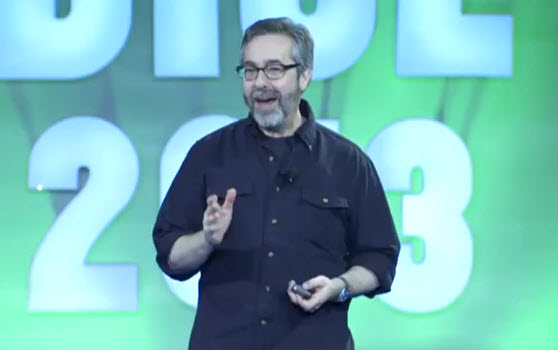At 57, Warren Spector is a famous and unemployed game developer. At last week’s DICE Summit, Spector gave a talk about his art form and acknowledged the “elephant in the room.” Disney had just shut down his video game company, Junction Point Studios, the maker of the Epic Mickey series.
He isn’t talking about exactly why that happened, but it’s no secret that the studio’s second release, Epic Mickey: The Power of Two, didn’t sell well. Spector made a lot of comments about how he felt like the oldest game designer, though he noted the presence of many “gray beards” in the room listening to his talk. Spector was understandably downbeat during his presentation, and he intimated that he felt like he was the oldest person still making games. But he found some silver lining in his tired but wise message.
“I worked with an amazing team on amazing projects,” he said. “I got to visit Disneyland as a contributor to the company.”
Quoting inventor Alexander Graham Bell, Spector said, “When one door closes, another opens. Another aphorism is more relevant. ‘Chaos is a friend of mine.’ Bob Dylan said it in 1965, and it is still true today. I have seen so much chaos in the last 35 years, you wouldn’t believe it.”
Being unemployed has given Spector a chance to reflect on the past. Lots of console-game developers are closing now. But Spector remembers how people thought gaming had no future when arcades died out. When the PC supplanted the Apple II, fans thought that was the end of games as well. Massively multiplayer online titles were going to put an end to single-player releases. Spector has heard it all, yet the interactive-entertainment industry continues to grow and spread out in all directions.
After Junction Point shut down, a programmer asked Spector if he wanted to retire. But Spector knew he wouldn’t.
“I still have stuff I want to make,” he said. “It was an eye-opening question. I am close to an end of a career. I’m not ready to retire yet.”
Spector believes, like Quantic Dream’s David Cage, that developers should grow up and figure out how to reach wider audiences with more diverse content. But he disagreed with every solution that Cage recommended in his own DICE talk, such as creating games with meaning.
Showing a slide of a violent scene, Spector said, “Some games should not be made.” He acknowledged that a time existed when he was young where a title only needed “transgressive adrenaline rush and spectacle.” Now he wants content that is relevant to him today, with intellectual offerings like Cage’s Heavy Rain and Telltale Games’ The Walking Dead.
Spector said, “I have no interest in guys who wear armor and swing big swords. I really don’t need to go there anymore. I want content that is relevant to my life. That is set in the real world.”
“If we are going to reach a broader audience, we have to think beyond teen boys and girls, about things that are relevant to normal humans,” he said.
Right now, games appeal to people who have a lot of time and the ability to master skills best done by 16-year-olds.
In his 50s, Spector feels confident in his abilities and doesn’t give a damn what others think. Emotionally, he’s in a good place. But he recognizes that time is scarce.
“You don’t have time to make mistakes anymore. You value passion over analytics,” he said.
He said that it’s OK to rely on others and slow down. It’s OK for him to think about helping others accomplish their goals and give back.
“Know thyself but be careful,” he said. Spector explained that you don’t want to work on a certain kind of game for 30 years because that is your habit. You have to think about what else you can do.
“You should push aside those geekish things quicker than I did because you don’t have as much time as you think,” he said.
And he has come to appreciate the importance of the word “legacy.”
He said, “Leave something behind. Most people who are working for 30 years. You are creating something new and different the world has never seen. Think of your legacy.”
What will he do when he is in his 60s?
“I cannot wait to find out,” he said.
VentureBeat's mission is to be a digital town square for technical decision-makers to gain knowledge about transformative enterprise technology and transact. Learn More

